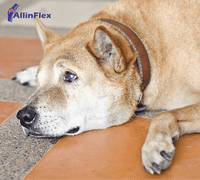Beds for Dogs with Joint Problems
Saskia OstermeierIn the realm of pet ownership, understanding our furry friends' health conditions is paramount to providing them with a comfortable and fulfilling life.
One such health issue that affects many dogs, especially as they age, is arthritis and other joint problems. Often, these issues can lead to discomfort and pain, hindering their mobility and overall quality of life.
One of the many ways we can alleviate our pets' discomfort is through proper sleep - a crucial element for all dogs but especially those with joint problems.
Quality sleep helps the body to repair itself, reducing inflammation and alleviating pain. However, not all sleep is created equal, and the kind of bed our dog rests on can significantly impact their rest quality.
Choosing the right bed for a dog with arthritis or joint problems can be daunting due to the variety of options available. This blog aims to provide clarity on this topic, guiding dog owners towards the best possible choices to ensure their canine companions live their life with as much joy and as little pain as possible.
Join us as we delve into understanding joint problems in dogs and how the right bed can make a world of difference.
Understanding Joint Problems and Arthritis in Dogs
Arthritis, a common ailment in dogs, particularly as they age, is an inflammation of the joints causing discomfort and pain. This condition is usually the result of ongoing wear and tear and deterioration of cartilage, leading to an increased friction in the joints.
Sometimes, it's due to genetic predispositions, injuries, or infections. Regardless of the cause, arthritis can significantly impact a dog's quality of life.

Symptoms of arthritis can vary from one dog to another.
However, some signs are commonly observed. The most prominent is limping, which may become more apparent after your dog has been lying down for a prolonged period.
You might notice your dog having a hard time standing up after a nap or struggle to climb stairs they previously bounded up without issue.
Other symptoms include stiffness, particularly after vigorous exercise, reluctance to move or play, visible swelling in the joints, and an overall decline in activity. Over time, these signs may become more apparent, revealing the progressive nature of arthritis.
In advanced stages, arthritis can lead to significant changes in a dog's behavior due to pain.
Your once playful and energetic pet might seem lethargic, irritable, or even depressed. Recognizing these signs early on and taking proactive steps can slow down the progression of arthritis, alleviating your dog's discomfort and improving their quality of life.
It's important to remember that arthritis and joint problems don't just affect a dog's physical well-being. They also influence their emotional health and their ability to interact with their environment.
Hence, a multi-faceted approach, starting with the selection of the right bed, can go a long way in making your dog's life better. In the following sections, we will discuss different types of beds and their benefits for dogs with arthritis.
Orthopedic Beds: The Solution to a Painful Problem?
Imagine sleeping on a hard, lumpy mattress; it wouldn't be very comfortable, would it? Now think of a dog with arthritis trying to rest on a bed without proper support.
This lack of comfort can exacerbate the pain and discomfort associated with their condition. This is where orthopedic beds come into play.
Orthopedic beds are specially designed to provide maximum support to your dog's body.
They're typically made with memory foam or other high-quality, dense materials that conform to your dog's shape, providing cushioning to sore joints and aching muscles.
One of the key benefits of an orthopedic bed is the support it provides. It distributes your dog's weight evenly across the bed, relieving pressure from painful joints.
This kind of support can make a noticeable difference to a dog with arthritis, potentially reducing their pain and improving their sleep quality.

Another benefit is the heat retention properties of orthopedic beds.
They can hold onto your dog's natural body heat, providing a cozy, warm spot for your pet to rest. This heat can help soothe sore joints and muscles, further promoting relief and relaxation.
But you might be asking, "Are orthopedic beds good for dogs with arthritis?"
The answer is yes. With their superior support and warmth, orthopedic beds can greatly benefit dogs with arthritis, helping to ease their discomfort and promote better sleep.
Elevated Beds: A High-Rise Relief for Joint Pains?
While orthopedic beds offer excellent support and warmth, another bed type worth considering for dogs with arthritis is the elevated bed. These beds, sometimes referred to as cot-style beds, lift your dog off the ground, providing an entirely different set of benefits.
Elevated beds feature a sturdy frame usually made of metal or plastic, with a tight, resilient fabric stretched across it. This design provides a supportive sleeping surface that effectively distributes your dog's weight, reducing pressure on aching joints - an attribute shared with orthopedic beds.
One unique benefit of an elevated dog bed is its promotion of airflow.
Being raised off the ground allows air to circulate around your dog, which can be particularly beneficial in warmer climates or during the summer months. This can help keep your dog cool and comfortable, something that flat, dense orthopedic beds might not achieve as effectively.
Ease of access is another notable benefit of elevated beds. For some dogs with severe arthritis, getting up from a flat bed can be a struggle. An elevated bed can make this process easier, reducing the amount of effort needed to stand up from a lying position.
So, are elevated beds good for dogs with arthritis?
The answer is yes, but with a caveat. While they do offer certain advantages, whether they're the best option will depend on your dog's specific needs, your climate, and your dog's individual preferences.
Other Factors to Consider When Choosing a Bed for Dogs with Joint Problems
While the type of bed - whether orthopedic or elevated - is essential, it's not the only factor to consider when choosing a bed for a dog with arthritis. There are a few other aspects that dog owners should keep in mind.
The size of the bed plays a significant role. It's essential to ensure the bed is large enough for your dog to lie on comfortably in their preferred sleeping position. Dogs with arthritis often find it difficult to curl up tightly, so a bed that allows them to stretch out can be more comfortable.
The material of the bed also contributes to its comfort level. Look for high-quality, durable materials that will hold up over time and provide consistent support. Beds with memory foam are often a good choice as they conform to your dog's body, offering tailored comfort.
Another factor is the bed's ease of cleaning.
Dogs with arthritis may have more accidents than their healthier counterparts, so a bed with a removable, machine-washable cover is a big plus.
Lastly, it's important to remember that each dog is unique. Some may prefer a softer bed, while others might need more firm support.
Observing your dog's preferences and behavior can provide valuable clues about what type of bed they might find most comfortable.
When it comes to selecting a bed for your dog with arthritis, it's not just about what the bed offers, but how well it aligns with your dog's specific needs and preferences.
Tailoring your choices to your dog's individual requirements can greatly improve their comfort and well-being.
Additional Ways to Support Dogs with Joint Problems
While choosing the right bed is a critical step in supporting a dog with arthritis, it is just one piece of the puzzle. It's important to take a holistic approach to manage this condition effectively.
Regular veterinary visits are essential to monitor the progression of arthritis and adjust the treatment plan as necessary. Your vet may recommend certain medications to manage pain and inflammation or suggest dietary supplements that can support joint health.
Physical therapy and weight management also play a key role in managing arthritis in dogs. Regular, low-impact exercise can help keep joints flexible and maintain a healthy weight, reducing the strain on aching joints.
Physical therapy, including massage and targeted exercises, can help improve mobility and decrease discomfort.
Your dog's living environment can also influence their arthritis. Simple modifications, like providing non-slip surfaces or using pet-friendly ramps to avoid stairs, can make your home more comfortable for a dog with joint problems.
Remember, arthritis is a progressive disease, but with proper management, your dog can live a comfortable, happy life.
It's about providing the right support, both physically with a good bed and emotionally with your love and care. Through understanding and compassion, you can help your dog navigate this challenging condition.

Taking care of a dog with arthritis or joint problems can be challenging, but with the right knowledge and resources, it's entirely manageable.
Choosing the right bed is an essential part of this process. Whether it's an orthopedic bed offering superior support and warmth, or an elevated bed providing airflow and easy access, the comfort of your furry friend should be paramount.
Bear in mind, each dog is unique. What works for one might not work for another. The best bed for your dog is one that meets their specific needs and preferences, providing them with a cozy, comfortable place to rest their aching joints.
Apart from the right bed, remember the importance of regular vet visits, suitable exercise, a balanced diet, and a comfortable home environment in managing your dog's arthritis. And above all, never underestimate the healing power of your love and care.
Arthritis can be a painful condition for our beloved pets.
However, with the right approach and dedicated care, you can significantly improve your dog's quality of life. Keep exploring, keep learning, and most importantly, keep loving your furry companion, because they need your support now more than ever.



